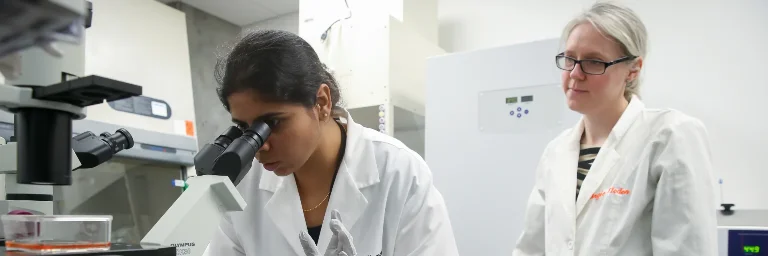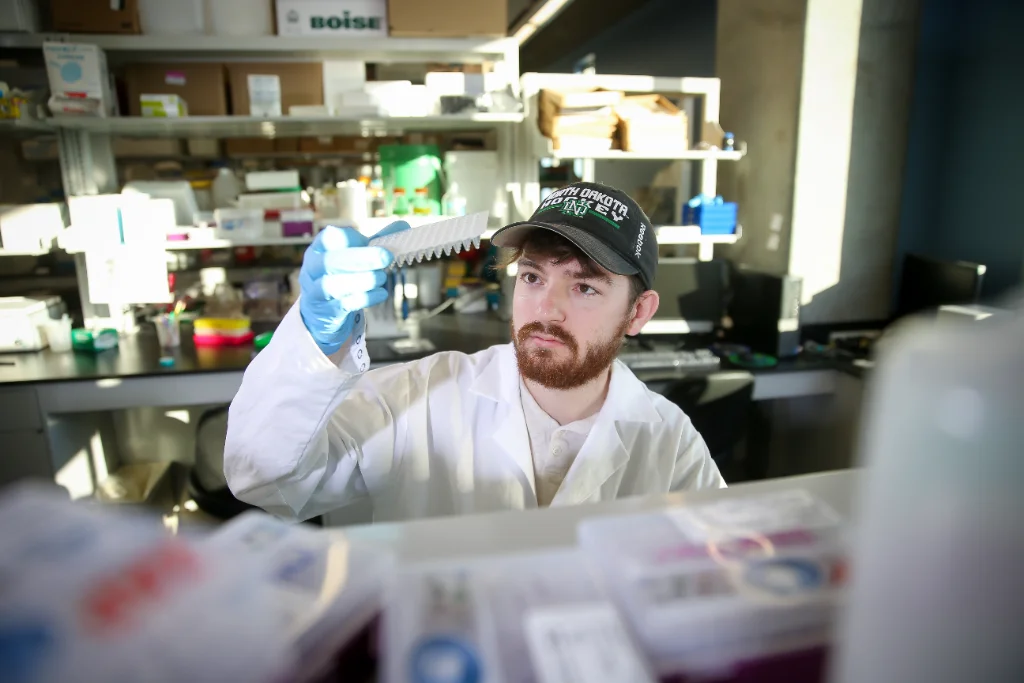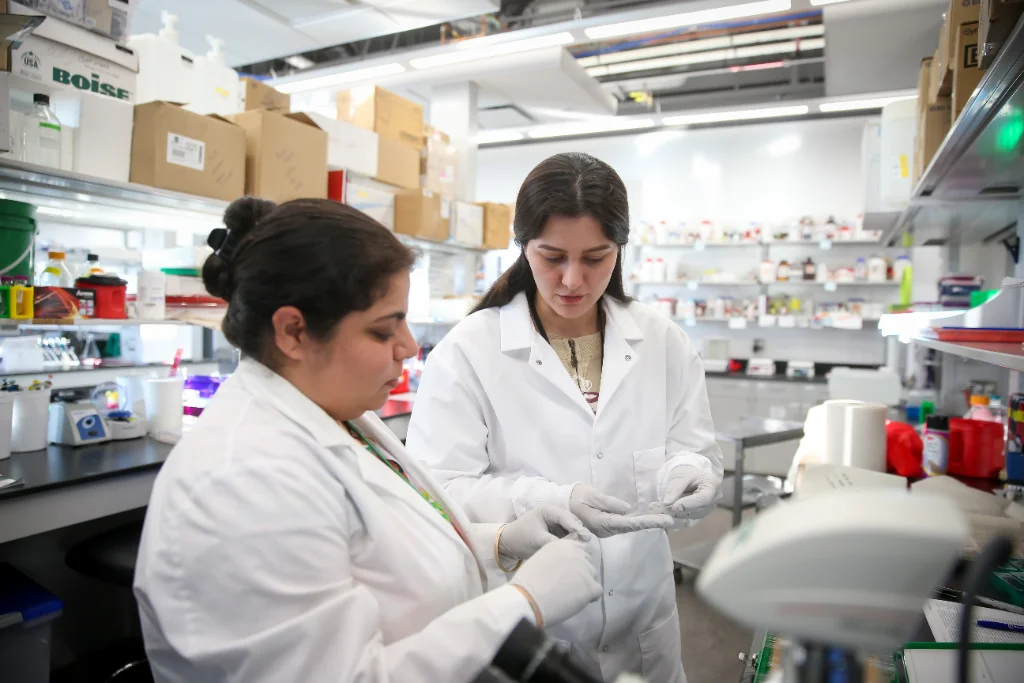
Is Biomedical Engineering Hard? Challenges & Career Insights
The human body is a marvel of biological engineering, comprising over 650 skeletal muscles and 206 bones, all orchestrated by the heart that beats approximately 2.5 billion times in an average lifetime.
Request Information
This intricate system circulates life-sustaining fluids and possesses an astounding capacity for self-repair and regeneration. However, despite its resilience, the body is not invincible. It is vulnerable to diseases, viruses, bacteria, injuries, and the wear and tear of daily life. In response to these challenges, biomedical engineering offers crucial interventions.
Given the significant role that biomedical engineering plays in enhancing human health, it's reasonable to ask, "Is biomedical engineering hard?" Indeed, the complexity of the human body requires that professionals in this field are extensively trained and highly knowledgeable across multiple disciplines to contribute to medical science.
Let's explore the challenging yet profoundly impactful field of biomedical engineering, its importance, and its transformative influence on healthcare.
Key Takeaways
- Biomedical engineering applies engineering principles to solve medical and biological problems.
- A strong foundation in math, science, and continual learning is essential for success.
- Biomedical engineers enjoy competitive salaries and meaningful work that impacts lives.
- Unlike traditional engineering disciplines, biomedical engineering focuses specifically on healthcare solutions.
Is Biomedical Engineering Hard?
Biomedical engineering, like its constituent fields of medicine and engineering, is commonly perceived as challenging. Combining the precision of engineering with the complexities of medical science, biomedical engineering indeed poses a demanding academic and professional field. Imagine how much precision and detailed planning is required to develop technologies that optimize our health (if something goes south, the cost can be the loss of human life).
But what specifically makes this field challenging, and what can aspiring biomedical engineers expect as they navigate their career path?
1. Educational Requirements
Biomedical engineering requires a solid foundation in both engineering principles and biological sciences. Therefore, aspiring biomedical engineers typically start with a bachelor's degree in biomedical engineering, where they learn the basics of human biology, chemistry, physics, and advanced mathematics alongside specialized engineering coursework.
For those seeking to advance their knowledge or specialize further, master's and PhD programs in biomedical engineering offer opportunities for deeper exploration into specific biomedical engineering challenges and innovations. These advanced degrees are crucial for those looking to lead research teams, teach at the university level, or innovate in high-stakes areas of the field, making them beneficial and often essential for career advancement.
2. Specialized Knowledge
The field of biomedical engineering is vast, encompassing several specialized areas such as:
- Biomechanics: This involves studying the mechanical aspects of biological systems. Biomechanics is used in developing everything from ergonomic office tools to prosthetics and sports equipment, requiring a deep understanding of how the body moves and reacts to physical stress.
- Bioinstrumentation: This specialization focuses on developing devices that assist in diagnosing and treating diseases. Technological advances have allowed biomedical engineers to build sophisticated tools that monitor health indicators like heart rate and brain activity, increasingly outside traditional medical settings.
- Biomaterials: Engineers in this area develop materials that can safely interact with the human body for medical purposes, such as implants and synthetic organs. Knowledge of materials science, chemistry, and biology is essential to create solutions that are both effective and biocompatible.

3. Experience
Practical experience through internships and research projects is also crucial in biomedical engineering and necessary to keep up with the competition.
These opportunities allow students to apply theoretical knowledge in real-world scenarios, dealing with constraints and unpredictable variables outside the classroom. Moreover, they provide invaluable networking opportunities, often leading to post-graduation job offers.
4. Job Market Competition
The job market for biomedical engineers is competitive, influenced by the rapid pace of technological advancements and increasing healthcare demands. According to the Bureau of Labor Statistics, the market for biomedical engineers will grow by 7% in the following years, with about 1,400 openings each year over the decade.
While significant demand exists for these professionals, the high stakes associated with their work mean that only the most skilled, innovative, and diligent individuals excel.
5. Continual Learning
Biomedical engineering is a rapidly evolving field where cutting-edge innovation may become tomorrow's standard practice. Continuous professional development is necessary to keep up with technological advances and new scientific discoveries.
For example, devices that provide real-time glucose monitoring for diabetes patients were once a futuristic concept but are now commonly used, improving the quality of life for millions worldwide. Moreover, these devices keep advancing as technology advances, and biomedical engineers who once created them need to keep up with the latest developments to ensure these devices continue to do their job.
6. Ethical and Regulatory Training
Lastly, biomedical engineers must navigate through many ethical considerations and regulatory requirements, such as patient safety and data privacy. All development and implementation of biomedical devices and treatments must comply with stringent regulations, which vary widely across different countries and regions. Understanding these legal frameworks is essential for successfully deploying biomedical solutions in clinical settings.
What are the Benefits of Biomedical Engineering?
With an average annual biomedical engineering salary of $100,730, this field offers excellent financial compensation. However, beyond this lucrative pay, biomedical engineers enjoy a range of other professional and personal advantages.
Improving Healthcare
Firstly, biomedical engineers are crucial in the healthcare sector thanks to their help developing technologies and devices that significantly enhance patient care. They are at the forefront of designing sophisticated medical equipment like MRI machines, artificial organs, and surgical robots, which assist in diagnosing diseases more accurately and treating them effectively.
Their contributions can lead to faster recovery times, reduced hospital stays, and better overall treatment outcomes, profoundly impacting patient health and quality of life.

Interdisciplinary Collaboration
Another standout benefit of biomedical engineering is the opportunity for interdisciplinary collaboration. Professionals in this field work closely with doctors, therapists, researchers, and healthcare administrators, creating a vibrant, interdisciplinary environment that fosters innovation.
Students Bianka Valecruz and Jaren Sandbeck exemplify hands-on, interdisciplinary learning. As undergrads, they showcased their research work on a smart shunt and test bench through a C2SHiP-sponsored project.
They presented their work at the 18th National Conference on Hydrocephalus (HA CONNECT). Through this project, they were able to engage directly with clinicians, researchers, and patients and gain practical skills and real-world feedback.
This is one of the many different experiences that set University of North Dakota (UND) students apart
Career Opportunities
The career paths available to biomedical engineers are diverse and abundant, spanning various industries, including healthcare, pharmaceuticals, medical devices, and academia.
Biomedical engineers can specialize in areas such as genetic engineering, biomaterials, medical imaging, and orthopedic surgery, among others. The field's broad scope allows professionals to find their niche or switch between different specialties, providing flexibility and numerous opportunities for career advancement.
Personal Fulfillment
Working in biomedical engineering also offers immense personal fulfillment. Many engineers are drawn to the field by the prospect of tackling pressing healthcare issues and making a tangible difference in the world. The satisfaction derived from developing a new therapy or technology that has the potential to save lives or restore health is immeasurable.
Additionally, this field continually challenges and stimulates its professionals, ensuring a career incredibly rich in personal growth and lifelong learning.
How Does Biomedical Engineering Differ from ME, EE, and ChemE?
When you’re exploring different engineering majors, especially if you’re drawn to a mix of science, math, and a desire to help people, it’s common to get overwhelmed when asking how biomedical engineering actually compares to the more traditional paths like mechanical, electrical, or chemical engineering. The lines between them can become blurry since sometimes the classes overlap, the tools are similar, and the job titles sound almost interchangeable.
However, the mindset behind each discipline and what each one is ultimately trying to solve is where things start to split. Now let’s see how biomedical engineering differs from mechanical engineering (ME), electrical engineering (EE), and chemical engineering (ChemE).
Biomedical Engineering vs. Mechanical Engineering (ME)
Mechanical engineering is rooted in the laws of physics and focuses on designing, building, and analyzing machines and mechanical systems, whether that’s in automotive design, aerospace, robotics, or manufacturing. Biomedical engineering, on the other hand, takes a lot of those same mechanics, such as fluid dynamics and structural analysis, and applies them specifically to the human body.
So, while an ME might be designing a more efficient car engine or wind turbine, a BME could be working on an artificial heart valve or a more ergonomic prosthetic limb.
Biomedical Engineering vs. Electrical Engineering (EE)
Electrical engineering is about signals, systems, power, and designing technologies that drive everything from smartphones to power grids. Biomedical engineering borrows those same concepts but channels them toward applications in healthcare, like EEG machines or imaging systems such as MRI and CT scans.
The overlap is real, especially in areas like signal processing or instrumentation, but the purpose and the person at the center of the work are what set these two apart.
Biomedical Engineering vs. Chemical Engineering (ChemE)
Chemical engineering uses chemistry, physics, and math to design processes that transform raw materials into valuable products, including things like pharmaceuticals, plastics, and fuels. A ChemE might be working on a large-scale chemical plant or optimizing a polymer production process, while a BME could be developing a targeted drug delivery system, working with biomaterials that interact safely with the body, or engineering tissues in a lab.
The Bottom Line
So, how hard is biomedical engineering? The answer truly depends on the individual. For those passionate about the field and motivated by the desire to contribute positively to healthcare, the challenges are engaging and rewarding. The training and in-depth knowledge required are seen as stepping stones to making a significant impact. However, for those whose interests lie elsewhere and who might be driven primarily by financial rewards, the field can seem daunting, and maintaining motivation can be challenging.
If you're considering a career as a biomedical engineer, the University of North Dakota offers exceptional programs that stand out for their
innovation and real-world application. UND's approach, which integrates practical experience with academic learning from the start, allows students to work on real-life problems and collaborate with industry partners
immediately after their classes. This approach has positioned UND as a pioneer in
biomedical engineering education, making it an ideal choice for aspiring biomedical
engineers seeking to make a real difference.
FAQs
Yes, biomedical engineering involves a substantial amount of math, including calculus, differential equations, and statistics, as these are crucial for designing and understanding medical devices and systems.
Biomedical engineering can be stressful due to the high stakes of medical device development and the need to meet strict regulatory standards, but it also offers immense satisfaction through its impact on patient care.
According to survey data, biomedical engineers rate their career happiness at 3.4 out of 5 stars, placing them in the top 40% of careers. This reflects a high level of job satisfaction often linked to the meaningful nature of the work.
Biomedical engineering is considered a stable career due to ongoing advances in medical technology and an increasing global emphasis on health and longevity, which drive consistent demand for innovation and development in medical devices and solutions.